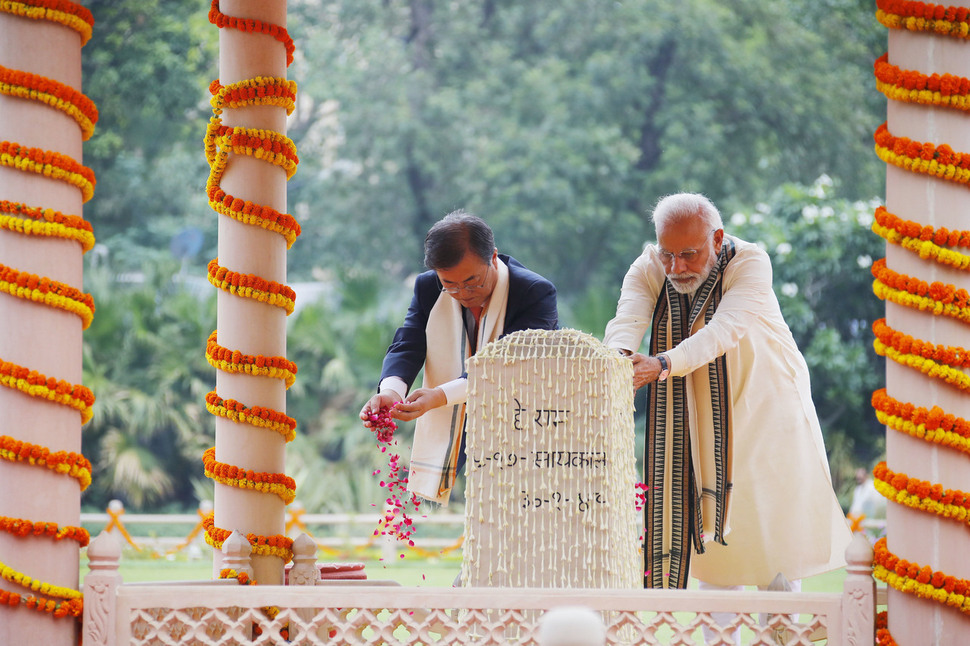Posted on : Feb.21,2019 09:06 KST
Modified on : Feb.21,2019 17:33 KST
 |
|
South Korea President Moon Jae-in and Indian Prime Minister Narendra Modi at the National Gandhi Museum in New Delhi on July 9, 2018. It was the first occasion of Modi visiting the museum with a foreign head of state. (Yonhap News)
|
On February 21-22, Indian Prime Minister Narendra Modi will undertake a state visit to South Korea (hereafter Korea). It is highly anticipated that the visit will provide further momentum in strengthening the India-Korea relationship, which is witnessing an upswing of late. During his previous visit to Korea in July 2015, the relationship was upgraded to Special Strategic Partnership, highlighting Korea as an ‘indispensable partner’ in India’s ‘Act East Policy’ (AEP).
The momentum in the bilateral relations imparted by Prime Minister Modi four years ago is now being complemented by President Moon Jae-in. Seoul upgraded New Delhi’s status in its foreign policy on par with that of its traditional partners, viz., US, China, Japan and Russia and further substantiated by the announcement of the ‘New Southern Policy’ (NSP) - a strategy to strengthen Korea’s relations with India.
A new dynamism in bilateral relations reflecting a strong convergence of interests in AEP and NSP was witnessed during President Moon’s state visit to India in July 2018. The joint vision document adopted at the Summit demonstrated a strong will and determination of the top leadership to advance bilateral relations, with a focus on three pillars, namely, people, prosperity and peace. Prime Minister Modi’s quick return visit is a statement of high priority attributed to India-Korea relations.
Over the last decade, India-Korea relationship has shaped into a comprehensive and multi-dimensional partnership. The bilateral agenda has expanded to include sophisticated partnerships in technology and defence along with the existing focus on commerce and trade. Under the Special Strategic Partnership agreement the Modi government identified Korea as a critical partner for its various development projects including Make in India, Smart City and Sagarmala, among others. In recognizing Korea as a development partner, Modi said “India want to achieve a lot of what Korea has already done” and that the “sectors which are strong in Korea are very important for the development of my country.”
A significant development in the infrastructure cooperation is the Korean financial support to the tune of US $10 billion. The fund would be used for three mega infrastructure projects in the state of Maharashtra, Nagpur-Mumbai super communication expressway (NMSE), Kalyan-Dombivali smart city and Bandra Government colony redevelopment.
Under Special Strategic Partnership trade and economic relations have also improved. Bilateral trade has shown improvement by reaching $20 billion in 2017, compared to $15.7 billion in 2016 and $16.2 billion in 2015. To improve utilisation rate of Comprehensive Economic Partnership Agreement (CEPA), New Delhi and Seoul are currently negotiating CEPA up-gradation to further liberalize trade. An interim agreement of an ‘Early Harvest Package’ was announced during the visit of President Moon and also set the goal of achieving USD 50 billion bilateral trade by 2030.
Korean investment in India also picked up momentum. Korean companies invested nearly USD 3.5 billion in the last three years into India’s automobiles and auto components, electronics, chemicals, technical textiles, food processing, finance and other industries. A notable trend in the investment sector is the growth of joint ventures between India and Korean companies in India reflecting further consolidation of economic ties between the two countries.
Recently, the bilateral relations have attained a strategic dimension with increasing cooperation in defence, security and regional issues. With increasing cooperation in defence, Korea has emerged to become a crucial partner for India’s defence modernisation project. A major highlight of the defence production cooperation is the partnership between India’s Larsen & Toubro (L&T) and Korea’s Samsung-Techwin to produce K-9 Vajra howitzers for the Indian Army. Recently Indian Military selected Korean built Biho self-propelled anti-aircraft defence system as the only candidate qualified for acquisition. The deal which is estimated to be US $1.6 billion announced in October 2018 is expected to be signed during the forthcoming visit of the Prime Minister.
The third pillar of India-Korea relations, i.e., cooperation to maintain peace and stability has acquired momentum, since both countries share the perception of growing uncertainty in the emerging order in the Indo-Pacific region. As a first step in this direction, India and Korea shared a joint vision for regional order during President Moon’s visit in 2018 by committing to ensure “a peaceful, stable, secure, free, open, inclusive and rules-based region”.
The optics of India-Korea relations have never been better. This has been particularly made possible by the high level political, diplomatic and cultural visits as well as well-crafted social media interventions by Prime Minister Modi and President Moon. Seoul’s cultural outreach, in particular, had a significant impact on the visibility of Korea and the knowledge of India-Korea ties. For instance, the visit of first lady Madam Moon to Varanasi as the Chief Guest in November 2018, on the occasion of Deepotsva celebrations in Ayodhya organised by the UP government appealed to a large number of Indians, who are otherwise not familiar with either Korea or India-Korea relations.
Amid a context where Korea is eagerly reaching out to India for diversifying its economic dependency on China, expanding it diplomatic horizon beyond Northeast Asia and grabbing opportunities offered by India’s economic rise, and India is looking at Korea as a development and strategic partner, Prime Minister Modi’s visit to Korea is an excellent opportunity to further consolidate the bilateral relations.
By Jojin V. John, Research Fellow of Indian Council of World Affairs
The views presented in this column are the writer’s own, and do not necessarily reflect those of The Hankyoreh.
Please direct questions or comments to [english@hani.co.kr]



